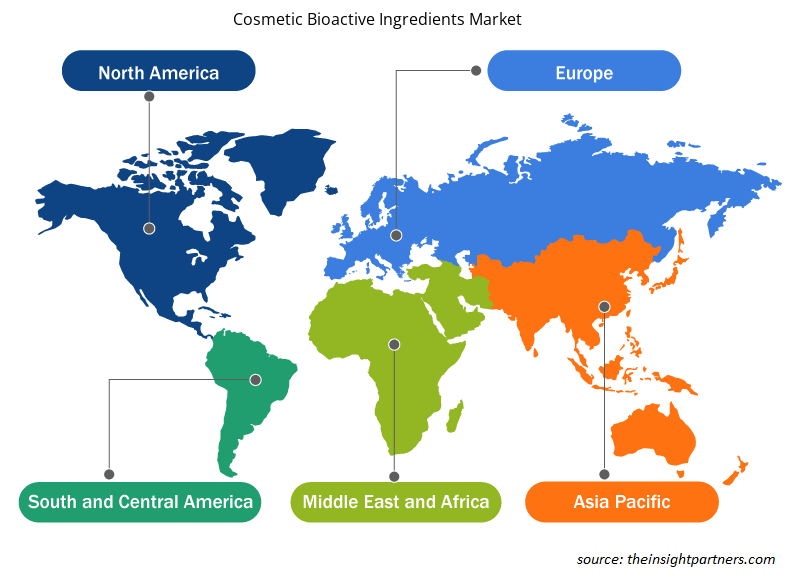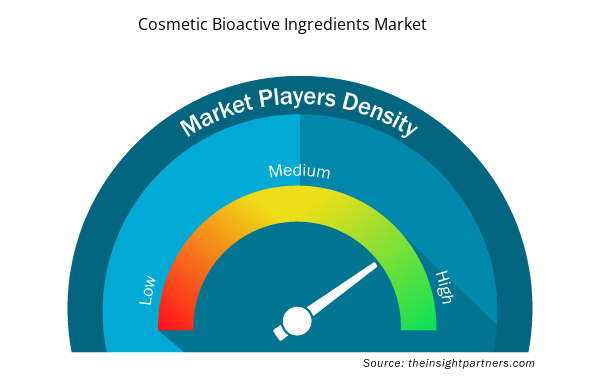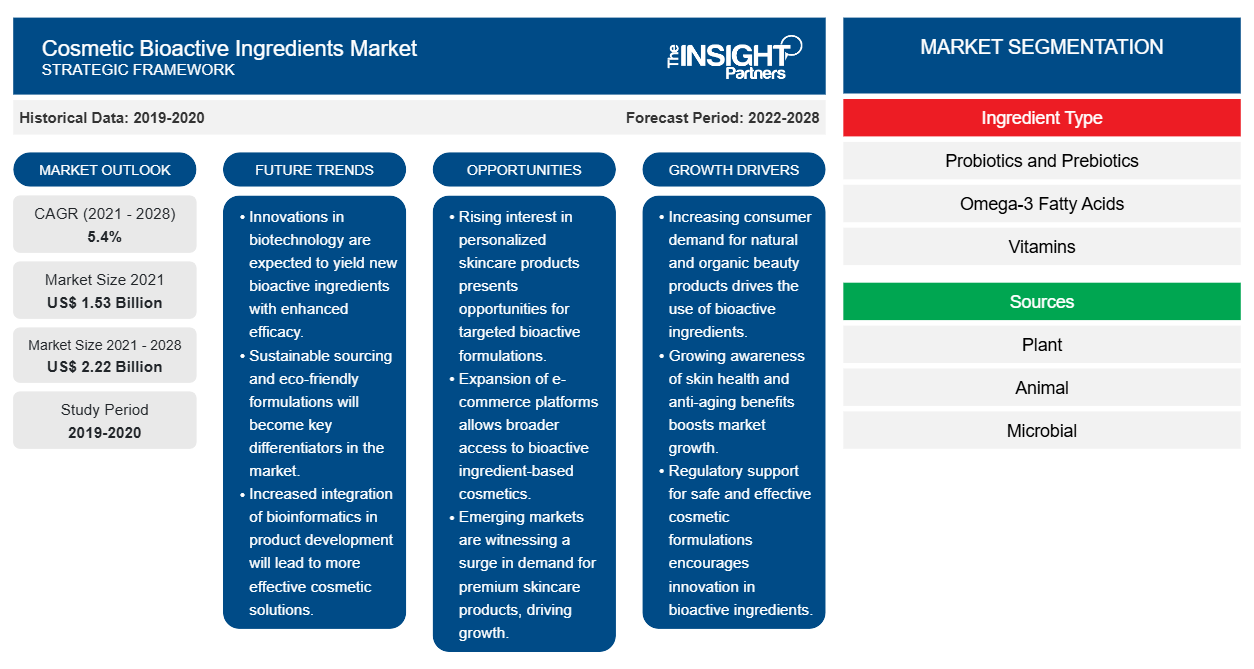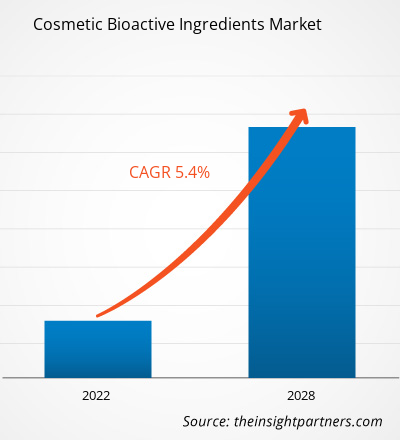化粧品用生物活性成分市場は、2021年の15億2,991万米ドルから2028年には22億1,596万米ドルに達すると予測されており、2021年から2028年にかけて5.4%のCAGRで成長すると推定されています。
化粧品は、肌や髪に塗布して洗浄、美化、魅力の促進、または外観の改善を行う製品です。このタイプの製剤に通常使用される有効成分の中には、商業的魅力、安全性、および相乗効果や多機能効果に関連することが多い豊富な組成のために、植物由来の製品を取り入れるという世界的な傾向があります。植物抽出物には、構造多様性の高い植物に存在する二次代謝産物が多く含まれています。フラボノイドと非フラボノイドの両方が、光保護、抗老化、保湿、抗酸化、収斂、抗刺激、抗菌活性などの興味深い化粧品特性に関連しています。これらの生物活性成分は、その生物活性成分と薬理作用により、皮膚科的利点を提供することが示されており、肌の若返り、光保護、創傷治癒などの潜在的な用途があります。化粧品生物活性成分市場の成長は、化粧品における天然成分の好みの高まりと、発売される生物活性成分の数の増加に主に起因しています。しかし、厳格な規制枠組みにより、化粧品用生物活性成分市場の成長は制限されています。
要件に合わせてレポートをカスタマイズする
このレポートの一部、国レベルの分析、Excelデータパックなど、あらゆるレポートを無料でカスタマイズできます。また、スタートアップや大学向けのお得なオファーや割引もご利用いただけます。
- このレポートの主要な市場動向を入手してください。この無料サンプルには、市場動向から見積もりや予測に至るまでのデータ分析が含まれます。
市場分析
天然製品に対する消費者の需要の高まりにより、化粧品に使用できる生理活性物質に関する研究が活発化しています。ヨーロッパには、BASFやDSMなど、最大手の生理活性成分メーカーやパーソナルケアブランドがいくつかあります。パーソナルケア業界向けの生理活性成分の発売が、市場の成長を牽引しています。2019年6月、BASF Care Creationsは、肌に潤いを与えて若返らせるランブータンの木を使用した、美容市場向けの3つの新しい有効成分を発売しました。同様に、2019年4月、Lonzaは、天然由来の成分(アファノテセサクラム多糖類とガラクトアラビナン)と水およびグリセリンのユニークな組み合わせであるH2OBioEV生理活性成分を発売しました。この成分は、必須の保湿剤を補充することで保湿能力を付与し、強力な表皮タンパク質バリアの形成と維持に最適な環境を促進します。
原料タイプに基づく洞察
成分の種類に基づいて、化粧品の生物活性成分市場は、プロバイオティクスとプレバイオティクス、オメガ3脂肪酸、ビタミン、カロテノイドと抗酸化物質、植物抽出物、ミネラル、アミノ酸、タンパク質とペプチドなどに分かれています。アミノ酸セグメントは、2021年に市場で最大のシェアを占める可能性があります。ただし、植物抽出物セグメントは、予測期間中に市場で最も高いCAGRを記録すると予想されます。
ソースベースの洞察
化粧品の生物活性成分市場は、その供給源によって、植物、動物、微生物に分類されます。植物セグメントは、2021 年に市場で最大のシェアを占める可能性があります。ただし、予測期間中、微生物セグメントは市場で最も高い CAGR を記録すると予想されます。
化粧品用生物活性成分市場で事業を展開する企業は、製品の発売、合併や買収、コラボレーション、製品の革新、製品ポートフォリオなどの戦略を採用して、世界中で事業展開を拡大し、ブランド名を維持し、エンドユーザーからの高まる需要に応えています。
化粧品用生理活性成分市場の地域別分析
予測期間を通じて化粧品用生物活性成分市場に影響を与える地域的な傾向と要因は、Insight Partners のアナリストによって徹底的に説明されています。このセクションでは、北米、ヨーロッパ、アジア太平洋、中東、アフリカ、南米、中米にわたる化粧品用生物活性成分市場のセグメントと地理についても説明します。

- 化粧品用生物活性成分市場の地域別データを入手
化粧品用生理活性成分市場レポートの範囲
| レポート属性 | 詳細 |
|---|---|
| 2021年の市場規模 | 15億3千万米ドル |
| 2028年までの市場規模 | 22億2千万米ドル |
| 世界のCAGR(2021年~2028年) | 5.4% |
| 履歴データ | 2019-2020 |
| 予測期間 | 2022-2028 |
| 対象セグメント | 成分別
|
| 対象地域と国 | 北米
|
| 市場リーダーと主要企業プロフィール |
|
化粧品用生体活性成分市場のプレーヤー密度:ビジネスダイナミクスへの影響を理解する
化粧品用生物活性成分市場は、消費者の嗜好の変化、技術の進歩、製品の利点に対する認識の高まりなどの要因により、エンドユーザーの需要が高まり、急速に成長しています。需要が高まるにつれて、企業は提供品を拡大し、消費者のニーズを満たすために革新し、新たなトレンドを活用し、市場の成長をさらに促進しています。
市場プレーヤー密度とは、特定の市場または業界内で活動している企業または会社の分布を指します。これは、特定の市場スペースに、その規模または総市場価値と比較して、どれだけの競合相手 (市場プレーヤー) が存在するかを示します。
化粧品用生物活性成分市場で事業を展開している主要企業は次のとおりです。
- コーニンクレッカ DSM NV
- 味の素株式会社
- ロケット・フレール
- アドミン
- BASF SE
免責事項:上記の企業は、特定の順序でランク付けされていません。

- 化粧品用生体活性成分市場のトップキープレーヤーの概要を入手
化粧品用生理活性成分市場 –原材料の種類
- プロバイオティクスとプレバイオティクス
- オメガ3脂肪酸
- ビタミン
- カロテノイドと抗酸化物質
- 植物エキス
- 鉱物
- アミノ酸
- タンパク質とペプチド
- その他
化粧品用生理活性成分市場 – 供給元別
- 植物
- 動物
- 微生物
化粧品用生理活性成分市場 – 地域別
北米
- 私たち
- カナダ
- メキシコ
ヨーロッパ
- フランス
- ドイツ
- イタリア
- 英国
- スペイン
- その他のヨーロッパ
アジア太平洋(APAC)
- 中国
- インド
- 韓国
- 日本
- オーストラリア
- その他のアジア太平洋地域
中東・アフリカ(MEA)
- 南アフリカ
- サウジアラビア
- アラブ首長国連邦
- その他の中東およびアフリカ
南アメリカ(SAM)
- ブラジル
- アルゼンチン
- 南米および中米のその他の地域
企業プロフィール
- コーニンクレッカ DSM NV
- 味の素株式会社
- ロケット・フレール
- アドミン
- BASF SE
- FMCコーポレーション
- ヴィトラスバイオテック
- カーギル株式会社
- センシエント テクノロジーズ株式会社
- デュポン
- 過去2年間の分析、基準年、CAGRによる予測(7年間)
- PEST分析とSWOT分析
- 市場規模価値/数量 - 世界、地域、国
- 業界と競争環境
- Excel データセット



Report Coverage
Revenue forecast, Company Analysis, Industry landscape, Growth factors, and Trends

Segment Covered
This text is related
to segments covered.

Regional Scope
North America, Europe, Asia Pacific, Middle East & Africa, South & Central America

Country Scope
This text is related
to country scope.
よくある質問
Global cosmetic bioactive ingredients market is segmented by region into North America, Europe, Asia Pacific, Middle East & Africa, and South & Central America. In North America, the U.S. is the largest market for cosmetic bioactive ingredients. The growth of the region is attributed to increasing product launches coupled with increasing adoption of cosmetics.
The Europe region is expected to account for the fastest growth in the cosmetic bioactive ingredients market. Technological advancement for extraction of bioactive ingredients in this region contribute to this dominant share. Additionally, rising preference for natural ingredients in cosmetic products are said to be responsible for this growth.
The cosmetic bioactive ingredients market majorly consists of the players such BASF SE, DuPont de Nemours, Inc., FMC CORPORATION, Cargill, Incorporated, Sensient Technologies Corporation, DSM, Ajinomoto Co. Inc., Roquette Frères, ADM, and Vytrus Biotech amongst others.
The plant segment dominated the global cosmetic bioactive ingredients market and accounted for the largest revenue share of 62.50% in 2021.
The amino acids segment dominated the global cosmetic bioactive ingredients market and held the largest revenue share of 20.81% in 2021.
Key factors that are driving the growth of this market is rising preference for natural ingredients in cosmetic products and increasing launch of bioactive ingredients.
Cosmetics are products made to apply to the skin and hair to cleansing, beautifying, promoting attractiveness, or improving appearance. Amid the active ingredients usually used in this type of preparation, there is a global trend of incorporating vegetable source products due to their commercial appeal, safety, and rich composition, often related with a synergistic or multifunctional effect. Botanical extracts are high in secondary metabolites that exist in plants with high structural diversity. Both flavonoids and non-flavonoids are related to interesting cosmetic properties like photoprotection, anti-aging, moisturizing, antioxidant, astringent, anti-irritant, and antimicrobial activity. With their bioactive components and pharmacologic actions, these bioactive ingredients have been shown to provide dermatologic benefits with potential applications for skin rejuvenation, photoprotection, wound healing, and more.
Trends and growth analysis reports related to Chemicals and Materials : READ MORE..
The List of Companies - Cosmetic Bioactive Ingredients Market
- Koninklijke DSM N.V.
- Ajinomoto Co., Inc.
- Roquette Freres
- ADM
- BASF SE
- FMC Corporation
- Vytrus Biotech
- Cargill, Inc.
- Sensient Technologies Corporation
- DUPONT
The Insight Partners performs research in 4 major stages: Data Collection & Secondary Research, Primary Research, Data Analysis and Data Triangulation & Final Review.
- Data Collection and Secondary Research:
As a market research and consulting firm operating from a decade, we have published and advised several client across the globe. First step for any study will start with an assessment of currently available data and insights from existing reports. Further, historical and current market information is collected from Investor Presentations, Annual Reports, SEC Filings, etc., and other information related to company’s performance and market positioning are gathered from Paid Databases (Factiva, Hoovers, and Reuters) and various other publications available in public domain.
Several associations trade associates, technical forums, institutes, societies and organization are accessed to gain technical as well as market related insights through their publications such as research papers, blogs and press releases related to the studies are referred to get cues about the market. Further, white papers, journals, magazines, and other news articles published in last 3 years are scrutinized and analyzed to understand the current market trends.
- Primary Research:
The primarily interview analysis comprise of data obtained from industry participants interview and answers to survey questions gathered by in-house primary team.
For primary research, interviews are conducted with industry experts/CEOs/Marketing Managers/VPs/Subject Matter Experts from both demand and supply side to get a 360-degree view of the market. The primary team conducts several interviews based on the complexity of the markets to understand the various market trends and dynamics which makes research more credible and precise.
A typical research interview fulfils the following functions:
- Provides first-hand information on the market size, market trends, growth trends, competitive landscape, and outlook
- Validates and strengthens in-house secondary research findings
- Develops the analysis team’s expertise and market understanding
Primary research involves email interactions and telephone interviews for each market, category, segment, and sub-segment across geographies. The participants who typically take part in such a process include, but are not limited to:
- Industry participants: VPs, business development managers, market intelligence managers and national sales managers
- Outside experts: Valuation experts, research analysts and key opinion leaders specializing in the electronics and semiconductor industry.
Below is the breakup of our primary respondents by company, designation, and region:

Once we receive the confirmation from primary research sources or primary respondents, we finalize the base year market estimation and forecast the data as per the macroeconomic and microeconomic factors assessed during data collection.
- Data Analysis:
Once data is validated through both secondary as well as primary respondents, we finalize the market estimations by hypothesis formulation and factor analysis at regional and country level.
- Macro-Economic Factor Analysis:
We analyse macroeconomic indicators such the gross domestic product (GDP), increase in the demand for goods and services across industries, technological advancement, regional economic growth, governmental policies, the influence of COVID-19, PEST analysis, and other aspects. This analysis aids in setting benchmarks for various nations/regions and approximating market splits. Additionally, the general trend of the aforementioned components aid in determining the market's development possibilities.
- Country Level Data:
Various factors that are especially aligned to the country are taken into account to determine the market size for a certain area and country, including the presence of vendors, such as headquarters and offices, the country's GDP, demand patterns, and industry growth. To comprehend the market dynamics for the nation, a number of growth variables, inhibitors, application areas, and current market trends are researched. The aforementioned elements aid in determining the country's overall market's growth potential.
- Company Profile:
The “Table of Contents” is formulated by listing and analyzing more than 25 - 30 companies operating in the market ecosystem across geographies. However, we profile only 10 companies as a standard practice in our syndicate reports. These 10 companies comprise leading, emerging, and regional players. Nonetheless, our analysis is not restricted to the 10 listed companies, we also analyze other companies present in the market to develop a holistic view and understand the prevailing trends. The “Company Profiles” section in the report covers key facts, business description, products & services, financial information, SWOT analysis, and key developments. The financial information presented is extracted from the annual reports and official documents of the publicly listed companies. Upon collecting the information for the sections of respective companies, we verify them via various primary sources and then compile the data in respective company profiles. The company level information helps us in deriving the base number as well as in forecasting the market size.
- Developing Base Number:
Aggregation of sales statistics (2020-2022) and macro-economic factor, and other secondary and primary research insights are utilized to arrive at base number and related market shares for 2022. The data gaps are identified in this step and relevant market data is analyzed, collected from paid primary interviews or databases. On finalizing the base year market size, forecasts are developed on the basis of macro-economic, industry and market growth factors and company level analysis.
- Data Triangulation and Final Review:
The market findings and base year market size calculations are validated from supply as well as demand side. Demand side validations are based on macro-economic factor analysis and benchmarks for respective regions and countries. In case of supply side validations, revenues of major companies are estimated (in case not available) based on industry benchmark, approximate number of employees, product portfolio, and primary interviews revenues are gathered. Further revenue from target product/service segment is assessed to avoid overshooting of market statistics. In case of heavy deviations between supply and demand side values, all thes steps are repeated to achieve synchronization.
We follow an iterative model, wherein we share our research findings with Subject Matter Experts (SME’s) and Key Opinion Leaders (KOLs) until consensus view of the market is not formulated – this model negates any drastic deviation in the opinions of experts. Only validated and universally acceptable research findings are quoted in our reports.
We have important check points that we use to validate our research findings – which we call – data triangulation, where we validate the information, we generate from secondary sources with primary interviews and then we re-validate with our internal data bases and Subject matter experts. This comprehensive model enables us to deliver high quality, reliable data in shortest possible time.


 このレポートの無料サンプルを入手する
このレポートの無料サンプルを入手する